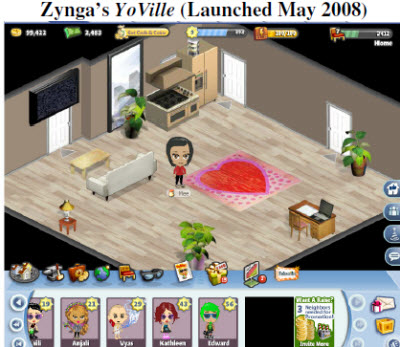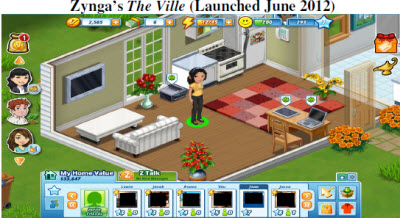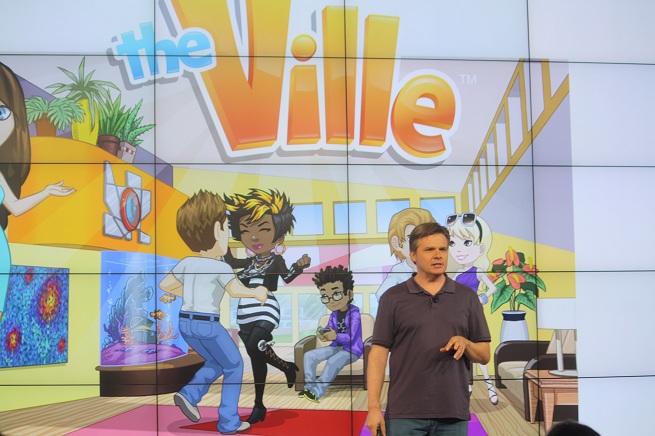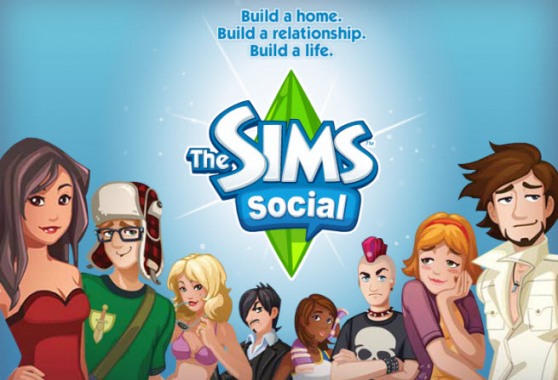Accused of copying Electronic Arts’ games, Zynga lashed back at its rival today in its first legal response to a copyright lawsuit.
Zynga said in a filing today that there is no merit to EA’s claim that Zynga’s recently launched The Ville was a copy of EA’s The Sims Social, which came out a year before. Zynga’s legal defense consists of several layers. The San Francisco social game giant made a motion to strike a number of allegations from the EA lawsuit that it said were irrelevant to the claims and inflammatory. Zynga has been quiet until now, but it is letting it rip. Zynga denied the copying charges and also alleged that EA tried to get it to break antitrust laws by proposing a no-hire collusion on snagging each others’ employees.
 Zynga said it received more than 3,000 unsolicited resumes from EA employees. But John Riccitiello, the chief executive of EA, allegedly hit the roof when Zynga stole executives John Schappert, Jeff Karp, and Barry Cottle. He allegedly sent an email to Schappert asking him to send back any EA employees who wrote to Schappert about working at Zynga. In turn, Zynga claims the copyright lawsuit is aimed at discouraging more employees from moving to Zynga and to mollify EA’s board, which wanted the defections to stop. (Ironically, the defections have stopped, and Zynga is now losing employees because it had a weak earnings report).
Zynga said it received more than 3,000 unsolicited resumes from EA employees. But John Riccitiello, the chief executive of EA, allegedly hit the roof when Zynga stole executives John Schappert, Jeff Karp, and Barry Cottle. He allegedly sent an email to Schappert asking him to send back any EA employees who wrote to Schappert about working at Zynga. In turn, Zynga claims the copyright lawsuit is aimed at discouraging more employees from moving to Zynga and to mollify EA’s board, which wanted the defections to stop. (Ironically, the defections have stopped, and Zynga is now losing employees because it had a weak earnings report).
“Today we responded to EA’s claims which we believe have no merit. We also filed a counterclaim which addresses actions by EA we believe to be anticompetitive and unlawful business practices, including legal threats and demands for no-hire agreements. We look forward to getting back to focusing all our efforts on delighting our players,” said Reggie Davis, general counsel of Zynga, in a statement.
Zynga also said in about 20 pages of text that it did not copy EA. It addressed each specific allegation. It also noted that Zynga launched its YoVille (2008, pictured right) people simulation game long before EA debuted its The Sims franchise on Facebook. And Zynga also said that Activision was the pioneer of people simulation games with its Little Computer People title (published in 1985), which was published long before The Sims debuted in 2000.
 In a detailed lawsuit, EA alleged that Zynga’s character models in The Ville were strikingly similar to EA’s in The Sims Social and that customizing the skin tones of characters was also nearly identical to the way that EA handled it in The Sims Social. Homes could also be built in almost exactly the same style, and that the doors in homes in The Ville are the same height as they are in The Sims Social. Zynga’s game also has a similar “home value” concept where the value of purchased items is tallied up.
In a detailed lawsuit, EA alleged that Zynga’s character models in The Ville were strikingly similar to EA’s in The Sims Social and that customizing the skin tones of characters was also nearly identical to the way that EA handled it in The Sims Social. Homes could also be built in almost exactly the same style, and that the doors in homes in The Ville are the same height as they are in The Sims Social. Zynga’s game also has a similar “home value” concept where the value of purchased items is tallied up.
EA launched The Sims Social in August 2011. The game became the biggest threat to Zynga’s dominance on Facebook, growing all the way to No. 2 and getting tens of millions of players. But the game didn’t have staying power, and its usage fell this year. When EA filed the lawsuit, EA Maxis chief Lucy Bradshaw said that EA was standing up for the industry. At that time, Zynga said that EA’s own SimCity Social bore a lot of resemblance to Zynga’s earlier title, CityVille. Zynga launched The Ville (left) in June.
Zynga described EA’s complaint as an “unrestrained ramble of immaterial, inflammatory, and prejudicial allegations that have no bearing on the issue at hand.” Zynga said in its response that both The Ville and The Sims Social belong to a longstanding and well-developed game genre known as “life simulation games” and no one, “including EA, may lay claim to the exclusive right to develop and release games in that genre.” Zynga said that EA did not invent the genre, as The Sims creator Will Wright acknowledged he had played Little Computer People before making The Sims.
Zynga said that particular scenes expressing regular life, like taking a shower, or “scenes a faire,” are not protectable. But it did point out that many “scenes a faire” from SimCity Social are similar to CityVille. Zynga noted that EA sued after The Sims Social had fallen from a peak of 66 million monthly active users over nine months to 15.5 million MAUs, down 78 percent.
Hilariously, Zynga responded to the “shower copycat” allegation, saying, “Zynga admits that in The Ville, when a player decides to take a shower, the player clicks on the shower stall, the player walks to the shower, the player takes off his or her clothes thereby revealing the player in undergarments, the player gets into the shower, the shower curtain closes, and steam appears on the top of the shower. Zynga lacks knowledge or information sufficient to form a belief as to the truth of the allegations regarding the bodily needs aspects of The Sims Social and therefore denies those allegations.”
EA spokesman John Reseburg said, “This is a predictable subterfuge aimed at diverting attention from Zynga’s persistent plagiarism of other artists and studios. Zynga would be better served trying to hold onto the shrinking number of employees they’ve got, rather than suing to acquire more.”
Here are links to the filings:
VentureBeat's mission is to be a digital town square for technical decision-makers to gain knowledge about transformative enterprise technology and transact. Learn More


